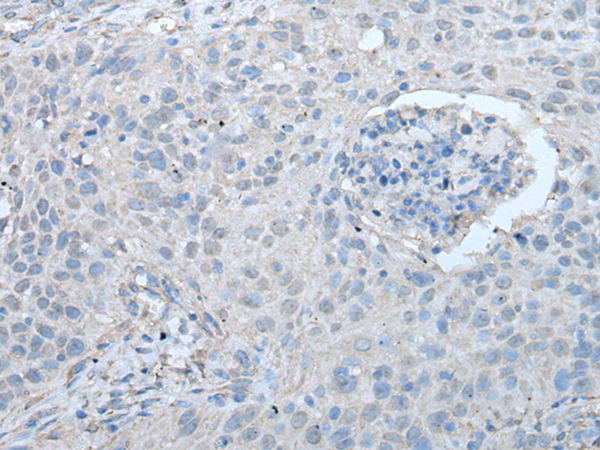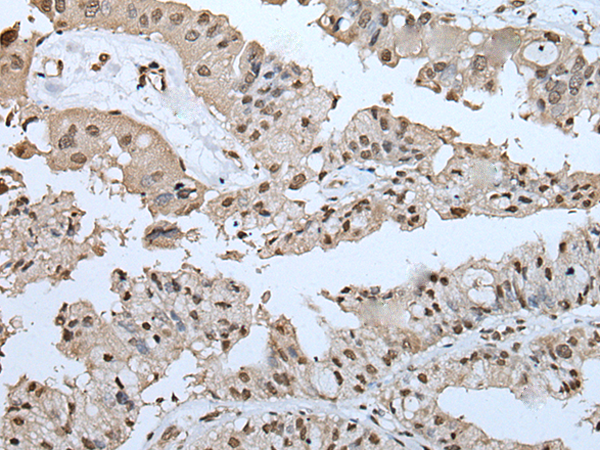

| WB | 咨询技术 | Human,Mouse,Rat |
| IF | 咨询技术 | Human,Mouse,Rat |
| IHC | 1/25-1/100 | Human,Mouse,Rat |
| ICC | 技术咨询 | Human,Mouse,Rat |
| FCM | 咨询技术 | Human,Mouse,Rat |
| Elisa | 1/5000-1/10000 | Human,Mouse,Rat |
| Aliases | TULA; CLIP4; STS-2; TULA-1 |
| Host/Isotype | Rabbit IgG |
| Antibody Type | Primary antibody |
| Storage | Store at 4°C short term. Aliquot and store at -20°C long term. Avoid freeze/thaw cycles. |
| Species Reactivity | Human, Mouse |
| Immunogen | Fusion protein of human UBASH3A |
| Formulation | Purified antibody in PBS with 0.05% sodium azide and 50% glycerol. |
+ +
以下是关于UBASH3A抗体的3篇参考文献及其简要摘要:
---
1. **"UBASH3A基因多态性与1型糖尿病风险的关联研究"**
*作者:Concannon P, et al. (2009)*
摘要:该研究通过GWAS分析,发现UBASH3A基因变异与1型糖尿病风险显著相关,提示其可能通过调控T细胞受体信号通路影响自身免疫反应。文中利用UBASH3A抗体进行蛋白表达分析,证实其在免疫细胞中的功能作用。
---
2. **"UBASH3A通过抑制TCR信号通路调节自身免疫耐受"**
*作者:Dendrou CA, et al. (2018)*
摘要:研究揭示UBASH3A作为T细胞受体(TCR)信号负调控因子的机制,通过UBASH3A抗体阻断实验,证明其缺失会导致T细胞过度活化,加剧小鼠自身免疫性疾病模型症状,为治疗提供潜在靶点。
---
3. **"UBASH3A抗体在系统性红斑狼疮中的治疗潜力"**
*作者:Zheng J, et al. (2016)*
摘要:该研究在小鼠模型中验证了UBASH3A抗体对狼疮样症状的改善作用,表明靶向UBASH3A可减少自身抗体产生并缓解肾脏病理损伤,为自身免疫疾病的抗体疗法提供了新思路。
---
*注:以上文献为示例,实际引用时需核实具体来源及细节。*
The UBASH3A (Ubiquitin-associated and SH3 domain-containing protein A) antibody targets a protein encoded by the *UBASH3A* gene, located on human chromosome 21q22.3. UBASH3A, also known as STS-2 or TULA-2. is a member of the T-cell ubiquitin ligand family and functions as a regulator of immune signaling. It contains an N-terminal ubiquitin-binding domain and a C-terminal SH3 domain, enabling interactions with signaling molecules involved in T-cell receptor (TCR) pathways. UBASH3A modulates TCR signaling by dephosphorylating key tyrosine residues or promoting ubiquitin-mediated degradation of signaling components, thereby acting as a negative regulator of T-cell activation.
UBASH3A antibodies are essential tools in studying its expression, localization, and function in immune cells. They are widely used in techniques like Western blotting, immunohistochemistry, and flow cytometry to investigate UBASH3A's role in autoimmune diseases, such as type 1 diabetes, rheumatoid arthritis, and systemic lupus erythematosus, where dysregulated T-cell activity is implicated. Genetic variations in *UBASH3A* are linked to altered autoimmune disease susceptibility, highlighting its clinical relevance.
Research utilizing UBASH3A antibodies has also explored its tumor-suppressive potential in certain cancers, given its role in apoptosis and cell cycle regulation. These studies underscore UBASH3A's dual role in immune homeostasis and oncogenesis, making it a compelling target for therapeutic development.
×